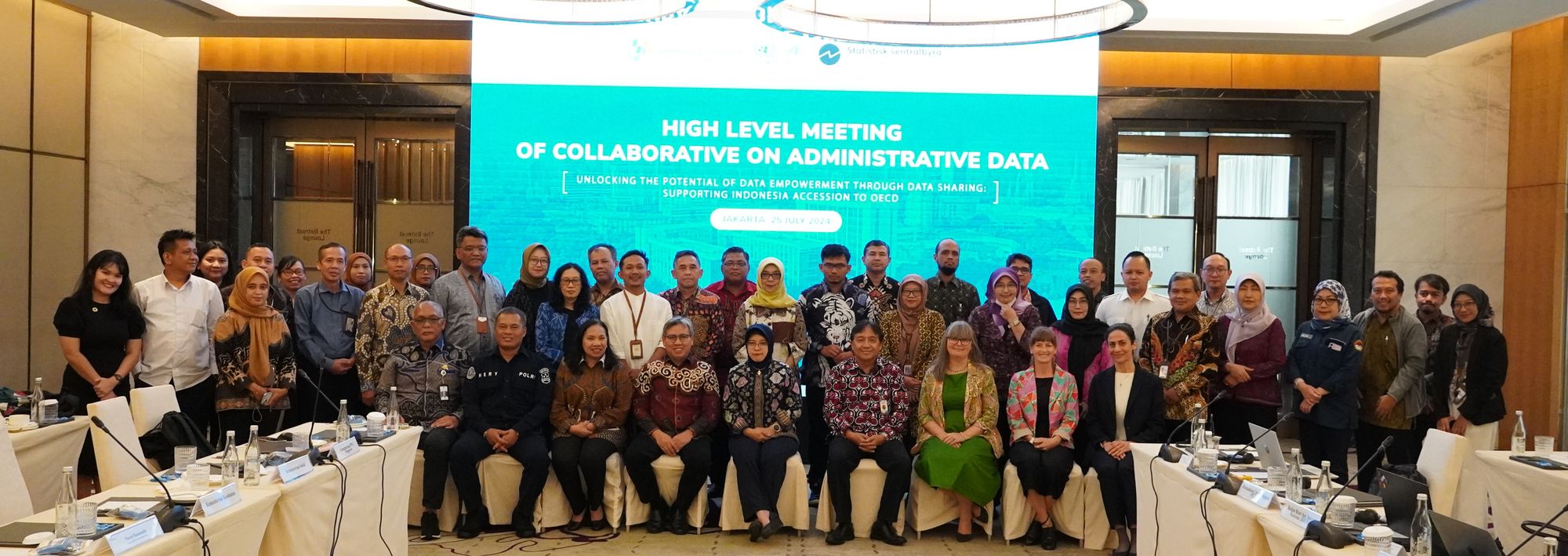
From July 22 to July 26, 2024, BPS Statistics Indonesia, managed by the SSHI (Sistem Statistik Hayati Indonesia) team from the Directorate of Population and Employment Statistics, held the Capacity Building Event on Increasing the Use of Administrative Data Sources for Producing Official Statistics in Jakarta. This pivotal event aimed to strengthen Indonesia's National Statistical System (SSN) in support of Indonesia’s accession to the OECD. The workshop brought together a remarkable blend of national expertise and international support, ensuring a comprehensive learning experience for all participants.
The event was supported by the United Nations Economic and Social Commission for Asia and the Pacific (UNESCAP), United Nations Statistics Division (UNSD), and Statistics Norway. Notable figures from these organizations played key roles in the workshop, contributing their extensive knowledge and experience in administrative data and official statistics.
The training sessions were designed to equip participants with practical skills in utilizing administrative data for statistical purposes. The first three days featured general technical training, where participants from various ministries and institutions learned about the importance of integrating administrative data, This training included discussions on quality assurance frameworks, statistical legal framework, fundamental principles of official statistics, and other important discussion topics.
On July 25, a high-level meeting was held with senior officials from ministries and institutions managing administrative data. This meeting focused on strategic steps to enhance institutional governance and support the development of a vital statistics development. Key discussion is need of the involvement of all parties in strengthening regulations, including Presidential Regulations and related laws/regulations, to improve the provision of quality data that aligns with national interests. The regulations need to cover mechanisms, data governance, integration of microdata for statistical purposes, access arrangements, confidentiality and security of individual data, data dissemination, and compliance with OECD requirements.
The final day, July 26, was dedicated to a training workshop on Register-Based Census (RBC) for BPS staff. Participants explored the development and utilization of the Statistical Population Register (SPR), learning about the legal, technical, and operational requirements for transitioning to an RBC system. The training emphasized the significance of comprehensive civil registration systems and the integration of various administrative data sources.
Throughout the event, several important points were highlighted:
- Utilization of Administrative Data. The use of administrative data, such as birth and death registrations, is crucial for producing official statistics and developing a robust SSN. Initiatives like Satu Data Indonesia and the Generic Statistical Business Process Model (GSBPM) were emphasized for data integration and quality assurance.
- Collaboration Between Institutions. Effective collaboration between statistical offices and administrative data producers is essential for generating high-quality macro indicators and comprehensive analysis. This includes ensuring secure and structured microdata for national policy-making.
- Best Practices and International Standards. Participants learned from international experts about best practices in administrative data integration and the standards required for OECD membership. The importance of legal frameworks, stakeholder support, and political commitment was underscored.
- Challenges and Solutions. The training addressed various challenges in using administrative data, such as differences in definitions, classifications, and reference periods. Solutions like data linkage, record linkage, and the "Signs of Life" methodology were discussed to improve data quality and coverage.
The event successfully enhanced the skills and knowledge of Indonesian experts in utilizing administrative data for official statistics. This initiative is a crucial step towards modernizing Indonesia's SSN and achieving the high standards required for OECD membership. The workshop set a strong foundation for future advancements in data integration and statistical production, supporting Indonesia's vision of becoming a developed nation by 2045.
